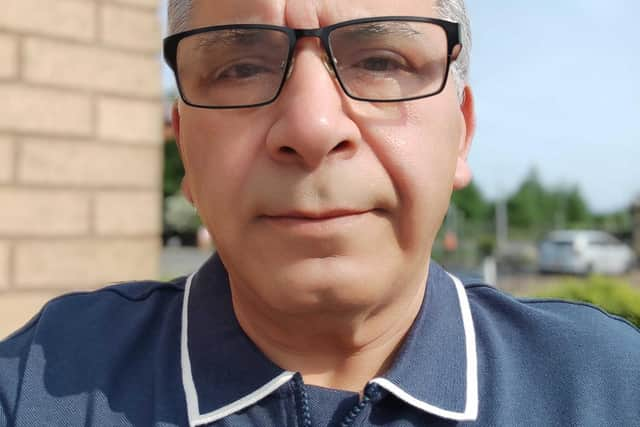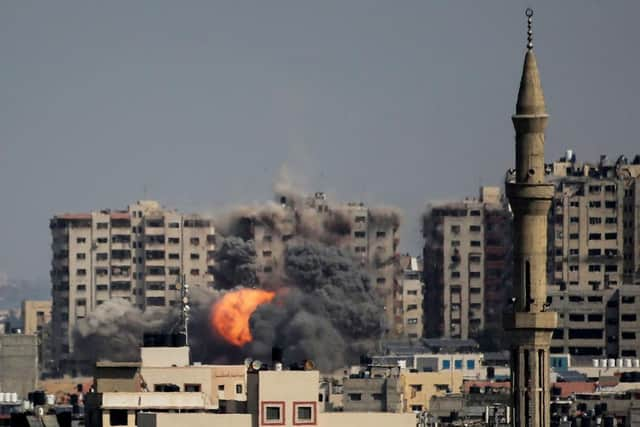‘The last time they sheltered in a school, we lost half the family’, says Glasgow man of relatives under bombardment in Gaza
A Scottish Palestinian man has told how his family in Gaza is sheltering in a school after fleeing their home during Israeli bomb attacks - eight years after losing 14 family members in a previous conflict when their bomb shelter was hit.
Wael Shawish, who has lived in Glasgow since the 1980s, is awaiting news of his wife, Doa'a Abu’ Amer’s, elderly mother, Mariam Abu’ Amer, as well as her two brothers and family - including four young children.
Advertisement
Hide AdAdvertisement
Hide AdOnly occasional messages have been able to get through, telling Mr Shawish that the family is safe, however he fears for their future as the effects of an Israeli siege on the territory mean food and water is in short supply, while heavy bombardments by the Israeli air force have devastated the already impoverished territory.


Like tens of thousands of other Gaza residents, Ms Abu’ Amer - who is in her 70s - and her two adult children, Mahmoud and Issam and their families, have taken refuge in schools run by United Nations agency the Relief and Works Agency for Palestine Refugees in the Near East (UNWRA). However, some of those buildings have already been hit in Israeli air strikes.
"All we know is that we get a message now and then to say that they're still safe, so hopefully that will continue,” he said.
"We know that the area where they live has been bombarded very heavily, but we don't know yet if their home has been affected or not. Property comes and goes but human beings, you can’t replace them if if something happens to them.”
Mr Shawish, an executive member of the Scottish Palestinian Forum, said other members of his wife’s family, including her sister and children, died in 2014 during the Gaza War, when the school they were sheltering in was hit by Israeli fire. More than 2,000 Gazans died in that conflict, which lasted a month, following the kidnapping and murder of three Israeli teenagers in the West Bank by Hamas-affiliated Palestinian militants.


"My wife is very nervous, they have told us they are sheltering in a school, but the last time they sheltered in a school, we lost half the family: 14 members died in one day,” he said, adding that he worries about his six nieces and nephews: Mohammed, 27, Abrahim, 19, Luban, 12, Majed, 10, Sufjan, 8 and Oubra, 6.
“The children who were old enough to remember losing their cousins will be very scared,” he said. “The younger ones, I think are more resilient than the older ones.”
Fears are growing of a humanitarian crisis in Gaza following retaliatory strikes since Hamas militants launched a major attack on Israel on Saturday.
Advertisement
Hide AdAdvertisement
Hide AdThe death toll in both Israel and Gaza has now passed 1,300.
Edinburgh-headquartered charity Mercy Corps said reported damage to water and sanitation facilities from airstrikes has jeopardised water, sanitation, and hygiene services to over 400,000 people in Gaza and warned of a “massive humanitarian catastrophe”. Before the latest crisis, almost 70 per cent of Gazans relied on aid for basic needs such as food and water.
Mr Shawish says his family has been receiving UN aid, but that it is starting to run out as the effects of the siege take hold.
"How long someone can survive without water and food depends on each individual's kind of resilience and their health,” he says. “Are they going to be able to do it until things get better or are there people who are going to suddenly and sadly pass away without seeing the next day? We don’t know.”
Mr Shawish, a retired financial sector worker, says civilians in Gaza have been unable to live a normal life for decades due to constant instability and economic blockades, which began in 2007.
His brothers-in-law have lost numerous businesses due to the ongoing conflicts. One now runs a shop, while the other is a painter and decorator.
"Since the blockades began, nobody is safe, nobody is secure, nobody has the means to realise their ambitions or their potential, not just my family, but that goes for everyone in Gaza,” he said. “Financially, they are struggling and stability is completely non-existent. They are reliant on help and handouts. Everybody that I know is just dreaming of leaving for somewhere better, which is not good for us as a nation, to be even more fragmented than we are at the moment.”
Advertisement
Hide AdAdvertisement
Hide AdHe described the Israeli retaliatory attacks as “revenge at its worst”.
"I don’t know how anyone can support it,” he said. “Revenge is not acceptable in any international law. We just have to be resilient and keep on with life.”
He says life in Gaza is unimaginable for people in Scotland.
“At the moment in Gaza, nobody can see any potential for them to become anything,” he said.
"It’s just like this: if they can eat, that's good. If they can’t, they go hungry. If they can have fresh water to drink, that’s good. If they can't, they will still drink the dirty water and hope for the best. Life is not normal. It's not what you and I are used to – and we expect them to behave in the same way that we would react to something that happens to us.”
He does not condone last Saturday’s attacks, which saw thousands of rockets fired into Israel and assaults on communities by Hamas militants who surged into the country.
“I don't support that kind of approach,” he said. “I prefer to be more diplomatic and have a political solution. But I don't have the same misery that these people have. It’s not about Hamas, it's about can we find a solution where these people who are suffering can have a better life and see a better future for their children and be able to realise their individual potential as human beings.”
Comments
Want to join the conversation? Please or to comment on this article.
